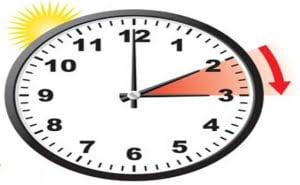
Daylight savings time threatens biological cycles
Researchers studying biological rhythms have discovered a disturbing trend. Setting clocks ahead for daylight savings time annually is causing a steady creep in important biological events, such as when plants bloom and animals emerge from hibernation. The effect of a single hour of daylight savings appears to cause no measurable change, but the cumulative sway from decades of time advancement has had major impacts, many of them negative.
The problem is most severe in Western Europe and North America, where setting clocks ahead one hour in the spring has been in practice since 1918, resulting today in a shift in biological events of 4.25 days.
“We’re finding evidence of advanced biological events in every case we examine,” reported Dr. Penelope Ticker of Greenwich University. “Bears are emerging from hibernation earlier than in the past, and many of them are waking up grumpy. This is creating a human safety risk.”
The problem is complex since the accumulation of hours has occurred to different degrees across the globe, throwing biological events out of sync. For example, migratory birds that leave southern countries where daylight savings is not in use or has been in place for much shorter periods of time are arriving late to their North American breeding grounds, in some cases out of sync with emerging insects that are their primary food source.
“Imagine what would happen if you had a reservation for dinner at a restaurant but you got there 4 days late,” said Dr. Ticker. “You might get dinner, and you might not. And you know how your spouse gets when they’re hungry.”
The research is fueling calls for abolishing daylight savings time globally to keep the problem from getting any worse. Large migratory birds, such as flamingos and trumpeter swans, have been observed carrying signs that say “Enough Tick Talk. Turn Back Now!” Dr. Ticker’s timely tough talk has even touched politicians, many of whom are feeling pressure from voters to finally do something on time.

We hope you enjoyed this news item for April Fools Day!